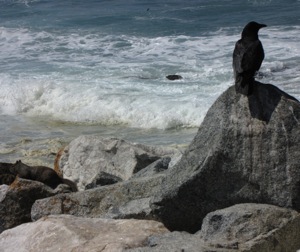Carbon Emissions and Osteoporosis of the Sea

Ocean Acidification topped the list of concerns for a panel of marine scientists opening the annual Society of Environmental Journalists conference in Miami this week.
The topic was oceans, and when moderator Nancy Baron of the science education group, COMPASS asked the scientists to “Tell us how it is, really,” panelist and top NOAA administrator Jane Lubchenco said that rapidly rising acidity in the ocean is a “huge challenge.”
“It’s the most important under-reported global environmental story today,” she said. “The ocean has become 30% more acidic over the last century, and this massive change is likely to have serious impacts, and it’s likely to get worse.”
And where it’s playing out first, said Lubchenco, is the Pacific Northwest. Coastal Washington and Oregon, she said, are “ground zero” for ocean acidification, due to upwelling from the deep ocean and local runoff that exacerbates the already acidifying sea.
An increasingly acidic ocean, she said, is sometimes referred to as “osteoporosis of the sea” because it affects the “hard parts” of organisms, causing shells to break down, or not form at all. This is not only lethal for the organisms themselves, she said, but it also disrupts the entire food chain. Lubchenco said new research is showing that rising acidity also affects organisms’ sense of smell and impacts reproduction. “This is an unfolding story,” she said. “There’s a lot we don’t know.”
Lubchenco said more research and monitoring is needed, but that’s unlikely to happen in this tough economic climate. She recommended that action be taken at the local level to reduce runoff into the sea, particularly nitrogen pollution, and to prevent overfishing and invasive species. But the only long-term solution, she said, is for the world to reduce carbon emissions.
For an explanation of how carbon emissions influence ocean acidification, and what that means for the world’s marine ecosystems, check out this four-minute video from NOAA.
3 thoughts on “NOAA Chief: The Climate Crisis the Media is Missing”
Comments are closed.

According to http://en.wikipedia.org/wiki/Ocean_acidification the ocean pH will only reach 7.824 by the year 2100. This is still in the basic part and not in the acidic part.
Then how can ocean water become “more acidic” if it was never acidic to begin with? Technically “less basic” would be more accurate.
But then again you can not get anyone to wet their pants over going more basic, acid sounds so some much more scary.
If readers would like more rational information on this subject and not the feelings of a political hack like Jane Lubchenco, go here — http://www.co2science.org/data/acidification/background.php
Excellent video! The best, and simplest, explanation I’ve come across yet of ocean acidification. I wonder how many high school students will see that video. Our education systems seem to be slow to embrace this problem.
Mr. Steele,
Solutions become more acidic when an acid is added to them, in this case massive amounts of carbonic acid, which is a weak acid but on large levels will influence pH. Acidification is a term often used in agriculture, food science and otherwise to describe how a solution is becoming more acidic from an added acid. The oceans are 30% more acidic than pre-industrial levels, and it’s very easy to see through basic chemistry.
Semantics aside, this is a massive environmental problem of unprecedented magnitude, and Jane Lubchenco is one of the most respected marine scientists in our nation with an enormous amount of publications. She is not a political hack, and is quite intelligent and delightful, so lose the harsh rhetoric. Furthermore, CO2 science is not a peer reviewed website or remotely objective. They do not create peer reviewed critiques to scientific papers, but instead skew the conclusions of published climate scientists to fit their own political ideals (they receive almost all of their funding from Exxon) . It’s not a credible source of scientific information, and you should listen to experts, not climate change denialists with a URL. If you want real data, go straight to the published papers themselves. Google scholar would work!
Best,
Matt